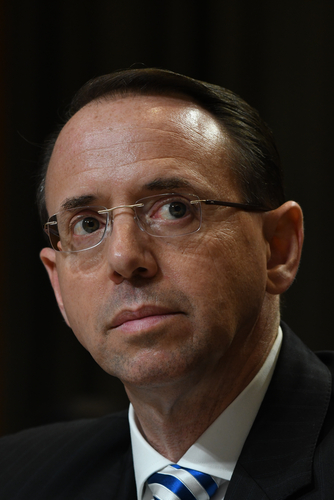Rosenstein denies any 'fishing expeditions' in Mueller probe

Deputy Attorney General Rod Rosenstein. mark reinstein / Shutterstock.com
Deputy Attorney General Rod Rosenstein said in a Sunday interview that special counsel Robert Mueller can investigate any crimes discovered in the scope of his probe, but “we don’t engage in fishing expeditions.”
In a Fox News Sunday interview, Rosenstein said the special counsel is bound by the rules and regulations of the Justice Department, and Mueller understands the specific scope of his investigation, report the Washington Post, the Washington Times and the New York Times.
If Mueller were to find evidence of a crime beyond the appropriate scope of the investigation, he would have to ask permission to expand his probe, Rosenstein said. “But we don’t talk about that publicly,” he said.
Mueller is authorized to investigate the Russian government’s efforts to interfere in the 2016 election, including links between the Russian government and individuals associated with Donald Trump’s presidential campaign. The authorization also permits Mueller to investigate “any matters that arose or may arise directly from the investigation.”
Also during the interview, Rosenstein said President Donald Trump has not directed the Justice Department to “investigate particular people,” but he wouldn’t comment on whether the president had ordered investigation of a specific matter, the Hill reports.
Rosenstein said he did not view Trump’s statements about the need to investigate Hillary Clinton’s emails as an order. “I view what the president says publicly as something he said publicly,” Rosenstein said.
“If the president wants to give orders to us in the department, he gives that to us privately. And then if we have any feedback, we provide it to him,” he said.
Addressing another issue, Rosenstein said the Justice Department wasn’t pursuing reporters in its stepped-up leak investigations, but there could be circumstances supporting a prosecution, according to the New York Times story.
“Generally speaking, reporters who publish information are not committing a crime. But there might be a circumstance where they do,” Rosenstein said. “I haven’t seen any of those today, but I wouldn’t rule it out in the event that there were a case where a reporter was purposely violating the law.”
Rosenstein’s interview came days after U.S. Attorney General Jeff Sessions said that the Justice Department is reviewing its policy on subpoenaing reporters.



